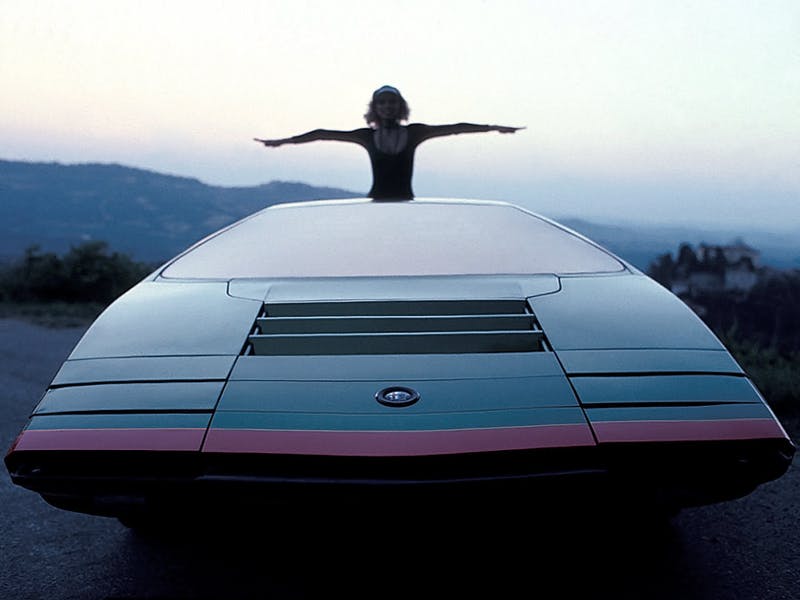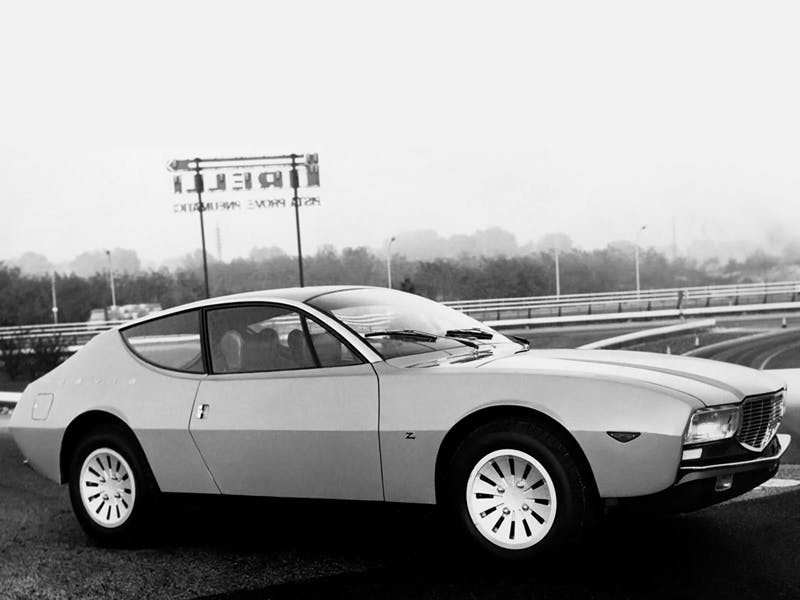10 Concept Cars of the ’60s We Wish They’d Built
We always want what we can’t have. A limited Japanese-only version of a record? People will pay high sums for those. A rare mistake on a pre-production watch? Gold dust. You get the idea.
However, few consumer goods have painted such vibrant visions of the future than cars, and fewer still have disappointed more in the transition from sparkly auto-show stardust to dowdy showroom stodge.
The 1960s was the true golden era of the concept car—everything was new, the future unspooling with rapid experimentation in aerodynamics, materials, and engineering know-how. The likes of Bertone, Ghia, Pininfarina, and Zagato delivered exquisite visions of a future that we simply didn’t get. While such flights of fancy could be understandable for independent coachbuilders, as a demonstration of their talents, in-house concepts and their inability to transition to reality perhaps hurt more. It’s a bit like a parent unveiling a tasty cheeseburger and then lobbing it into the trash right in front of their child.
However, let’s not let these magnificent creations be rendered only to history. Indeed, some have become well known; some inspired the next epoch in supercars; others are tantalizing what-might-have-beens. These are just a few of our favorites.
Alfa Romeo Carabo by Bertone (1968)

The late, great Marcello Gandini’s masterpiece revolutionized supercar design. Alfa Romeo’s 33/2 Stradale, while beautiful, had struggled to find buyers at many times the cost of a Lamborghini Miura, so Alfa handed over five chassis to the cream of Italy’s design houses. Built in super-quick time, the Carabo introduced the wedge design to the world, as well as vertically opening doors. The DeTomaso Pantera and Lamborghini Countach would make the wedge a reality, but what a future Alfa Romeo could have had if this had made series production.
Plymouth VIP Concept Car (1965)

Introduced at the 1964 Chicago auto show, this full-size convertible featured a retractable glass canopy with a roll bar down the middle. We’ve all seen some convertible adaptations on sedans with side-to-side roll hoops that look like Dirk Turpin’s hat or a disused playground covered in a tarpaulin. This solution is surely far more elegant. The roof was made of photochromic material that tinted automatically in bright light or could be lowered. Inside, there was seating for four, a reel-to-reel tape player, and in-car television.
Chevrolet Corvette XP-819 (1964)

With the latest iteration, the Chevrolet Corvette has finally moved its engine from its traditional home, its snout, but such a move has been on the cards for some time. Indeed, right back to the 1960s—the XP-819 was a complete custom build with regard to the chassis, suspension, and steering, and clothed in a Larry Shinoda–penned body. Sadly, after it crashed during testing it was ordered to be destroyed—though it was saved by Smokey Yunick. It was later sold to a GM dealer and was recently restored for the 2020 Amelia Island Concours.
Jaguar XJ13 (1966)

With Ferrari heading down the mid-engined route for Le Mans, Jaguar fancied a bit of the action. The concept had been floated as early as 1960, but work didn’t begin until 1965, using a double-overhead-camshaft V-12—and that had its roots back in 1950. The Malcolm Sayer–designed shape covered a V-12 drawn up by William Heynes and Claude Bailey that was good for more than 500 hp. However, the project took so long to achieve that FIA regulations were soon to be curtailed, and Ford had stolen a march on everyone with the Ford GT40. If only Jaguar had gotten there sooner . . .
Maserati Simun (1968)

Revealed at the Turin motor show in 1968, the Simun was Ghia’s take on what a new 2+2 Maserati could look like. Penned by Giorgetto Giugiaro, it featured retractable headlamps and a sharp-suited style. Maserati would eventually choose the curvier Indy, but the Simun would go on to influence several cars. Like the Aston Martin DBS of the time, the Simun was a strong move away from curves and could have set Maserati for a very different look in the early 1970s.
Porsche 911 Roadster by Bertone (1966)

Built for American dealer John von Neumann and revealed at the 1966 Geneva motor show, Bertone’s elegant take on the 911’s mechanicals was an exercise in safety. While the interior was beautifully styled, great lengths were made to separate the passenger compartment from the rest of the body. Porsche, which wasn’t keen on the idea to begin with, was even less pleased by the car’s lukewarm response from show-goers and the need to reinforce the chassis. Bertone had done away with anything that made it look like a 911, too—and it would also be hideously expensive to build. The Roadster remained a one-off, which von Neumann took back to the U.S. with him.
Buick Century Cruiser (1969)

We’re living in a very real world where automated driving is already happening—and this 1969 concept envisioned such a future. Beneath the swoopy body lay a luxurious interior; you simply input punch cards with predetermined routes programmed with information provided by electric highway centers, with the car monitored by a radar-like device. You’d still have the option to drive it yourself, but if you wanted to relax you could enjoy the swivel contour seats, fridge, and TV set. We’d do without the automated driving part—can you imagine pulling up to the golf club in one of these?
Ford Cougar 406 (1962)

The Mercedes-Benz 300SL Gullwing was a lightning rod of desirability throughout the automotive world, and it’s unsurprising that design departments would take inspiration. This was Ford’s take on the winged wonder, revealed as a concept car for the Thunderbird. Built by Dean Jeffries, it was first shown at the 1962 Chicago auto show and later used as part of the Custom Caravan program, before appearing in the film Under the Yum Yum Tree, starring Jack Lemmon.
The Cougar 406 didn’t just look the part, it had serious oomph too—it was powered by a 406-cubic-inch V-8 good for 405 hp and 448 lb-ft of torque. Feared lost for many years, the car is believed to still be around in an unrestored state, somewhere in the Detroit area. Interestingly, the Mustang was very nearly called the Cougar—what a car that would have been if it ended up like this.
Lancia Flavia Super Sport by Zagato (1967)

The Lancia Fulvia Zagato is one of the most cherished classics of the modern age, but Lancia and Zagato’s collaboration goes far beyond that car. There could have been more, but sadly the declining fortunes of an independent Lancia at the end of the 1960s meant some failed to make a production reality.
Take this Flavia Super Sport, penned by Ercole Spada. An evolution of the earlier Flavia Sport Zagato, it was entirely redeveloped by Spada, with a much more slippery and curvaceous look to the normal Flavia Zagato. Used as an aerodynamic study, it features innovative ideas such as those turbine wheels. Hopes for a production version were high when it was revealed at the 1967 Turin show, but they were not to be realized. Instead, Elio Zagato pressed the Super Sport into service as his personal car for the next five years, before selling it on. The car survives to this day.
Fiat 2300S Speciale by Pininfarina (1965)

The last of five Pininfarina concepts based on Fiat’s top-of-the-line model, the 2300S Speciale was an exercise in aerodynamic efficiency. As such, it was notable for its lack of chrome adornments. First displayed at the 1965 Turin auto show, this two-seater coupé was deeply luxurious.
Though you can clearly see the influence of Alfa Romeo’s Duetto and several Ferraris of the era, it’s not hard to see how something like this could have elevated Fiat’s premium ambitions at the time.



The XJ13 yes!
The rest ehhhh no. The Fiat looks like a bad Corvair.
The Corvette here was a crude car that did wheelies. Too much rear weight. Even with the Aluminum engine. It also had to ber reverse rotation. I love Corvettes but that was one that never should be built.
The Carabo still looks right all these years later. Maybe it’s time to look for a Fiberfab kit version…